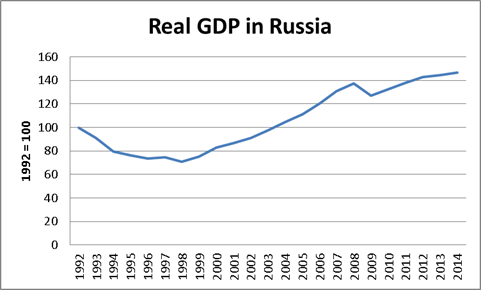September 05, 2014
An interview on Morning Edition with Edward Lucas, senior editor at The Economist and author of The New Cold War, likely mislead listeners about the path of the Russian economy and corruption under President Putin’s period in power. Lucas implied that Russians are likely to be very unhappy about the current state of the economy and public services and angered over the extent of corruption in the country.
While undoubtedly there is much corruption in Russia under Putin, corruption did not begin with Putin. According to the World Bank (Table 4.3A), Russia got $8.3 billion for all the assets it privatized in the 1990s. This was a period in which it sold off the vast majority of the industry built up during the Soviet years, as well as much of its oil and natural resources. By comparison, Snapchat currently has a market value of $10 billion. During this period well-connected people were able to become billionaires by buying assets at prices far below the market level.
This was also a period in which Russia’s economy collapsed. According to data from the International Monetary Fund, Russia’s economy shrank by almost 30 percent during President Yeltsin’s tenure. (This is about six times the drop in GDP the U.S. saw in the Great Recession.) Since Putin came to power in 1999 it has more than doubled in size. This economic performance likely explains much of the support shown for Putin in public opinion polls.

Source: International Monetary Fund.
Note: Name of president corrected — the decline took place under Yeltsin, not Putin. Thanks Daniel. Also, Putin came to power in 1999, not 1998 as previously written.







Comments